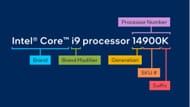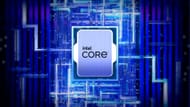Choosing between Intel 12th gen and 13th gen remains a hot topic for gamers looking to achieve the maximum possible performance per dollar. While the Intel 13th-generation processors undoubtedly perform better than the 12th-generation, the question arises: Are the upgrades really worth it?
The 13th gen features a higher core count and more tweaks to the architecture but the answer lies in the price-to-performance ratio.
In this article, we'll have a look at the Intel 12th-gen and 13th-gen laptop CPUs and compare their performance, battery life, and thermal management to help you decide if the performance bump is significant enough for you to go for the higher-priced 13th-gen gaming laptop.
Note: This article is subjective and reflects the writer's opinions.
Intel 12th gen vs 13th gen CPU: Naming scheme explained

Before we jump into our Intel 12th gen vs 13th gen comparison, it is important to note that not all Intel 12th-gen and 13th-gen processors are built equally even if they have similar-sounding names.
While most of you are familiar with the Core i3, Core i5, Core i7, and Core i9 processor groups, Intel also segregates its laptop processors by attaching HX, H, P, and U suffixes to the end of the model numbers to denote differences in performance.
Here’s what each of the suffixes means:
HX: High-performance processors with overclocking capabilities which make them ideal for demanding tasks like video editing and gaming.
H: High-performance chips that are similar in performance to the HX chips but lack overclocking capabilities.
P: These chips offer a balanced blend of performance and efficiency.
U: Generally found on low-powered laptops with battery performance as the focus.
Intel 12th gen vs 13th gen: Processor comparison
Intel Core i9-12900HX vs Intel Core i9-13900HX

Both the 12900HX and 13900HX are high-performance CPU Core i9 processors for gaming laptops. The Intel 12th gen i9 has a slight edge in core base frequency compared to the 13th gen i9, however, this difference quickly disappears when we compare other important hardware specifications of the 13th gen.
The 13900HX features a significantly higher boost frequency of up to 3.9 GHz compared to 3.6 GHz in the 12900HX. This higher boost clock results in better performance on CPU-intensive titles like Counter-Strike 2 and Valorant. Meanwhile, the higher E-Core thread count improves user experience for a smooth day-to-day performance.
Here’s a side-by-side benchmark comparison for both processors to give you an idea of their real-world performance (via NanoReview):
As we can see, the 13900HX maintains a consistent lead across multiple benchmarks, performing around 24% better in the Geekbench 6 Multi-Core and 29% better in the Passmark CPU test.
Overall, the 13th gen processor maintains a clear lead compared to 12th gen, making it a worthy investment if you’re looking for a high-performance gaming laptop.
Intel Core i5 1250P vs Intel Core i5 1350P

While the only difference between 1250P and 1350P is the higher base and boost clock speeds on the 13th gen, we see a similar performance gap when comparing the mid-range Intel 12th gen and 13th gen processors.
Benchmarks clearly show this difference where we can spot 1350P pulling consistently higher numbers than the 1250P.
Here’s a side-by-side comparison of both the processors (via NanoReview):
As we can see, the 1350P scores 24% higher in the Cinebench R23 Multi-Core test and 16% better in the Geekbench v6 Multi-Core testing. This clearly establishes 1350P as a better budget gaming laptop processor compared to its 12th-generation counterpart.
Intel 12th gen vs 13th gen: Temperatures and efficiency

Both Intel 12th gen and 13th gen CPUs use the latest 10nm process and hybrid architecture to manage power draw between performance tasks and simple low-powered usage.
The power consumption is managed by Intel’s new Thread Director technology which helps coordinate the processes between P-Cores and E-Cores. By doing so, both 12th gen and 13th gen CPUs manage to perform well without excessive power draw and heat generation.
That said, the architectural refinements are visible in the 13th-gen CPUs. They perform better than the 12th-gen while maintaining similar power draw and temperatures, resulting in better performance-per-watt for the 13th-gen CPUs.
Intel Core 12th gen vs 13th gen: Conclusion
Then Intel 12th gen and 13th gen processors showcase the company's commitment to pushing boundaries in mobile computing. The hybrid architecture and Thread Director have significantly boosted the performance of Intel CPUs.
However, when comparing the 12th gen vs 13th gen CPUs, the newer generation clearly outperforms the older generation by a significant margin. The 13th-generation Intel CPUs are more powerful, future-proof, and efficient, making them a better investment when choosing a gaming laptop.
Check out more articles below:
5 laptops with the best screens || Lenovo Legion Series vs HP Omen Series || Is a gaming laptop worth buying over a desktop? || Core i5 vs. Ryzen 5: Which is best for gaming laptops in 2024?
